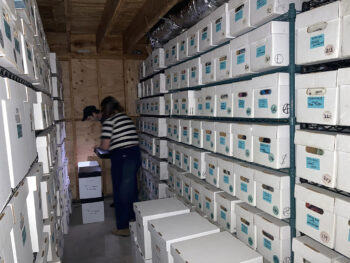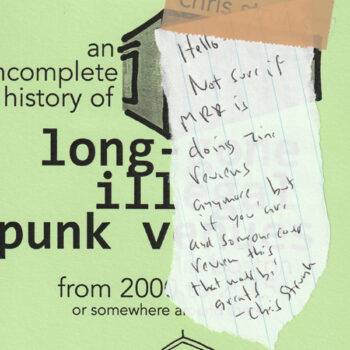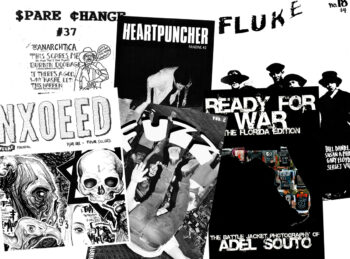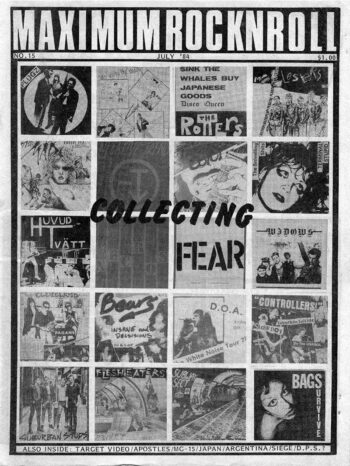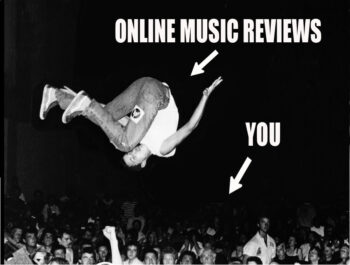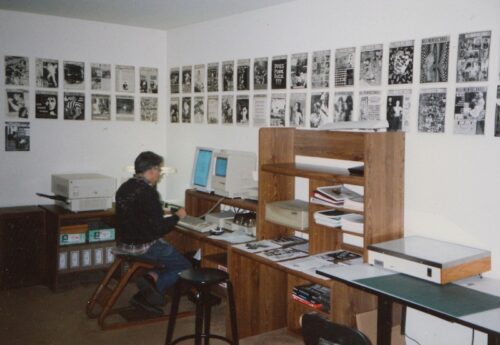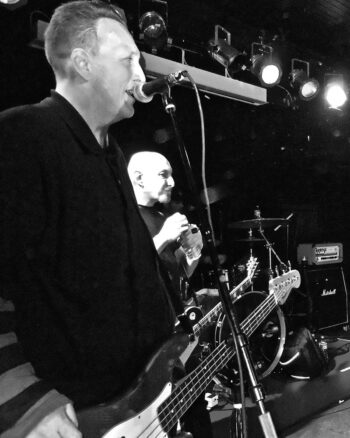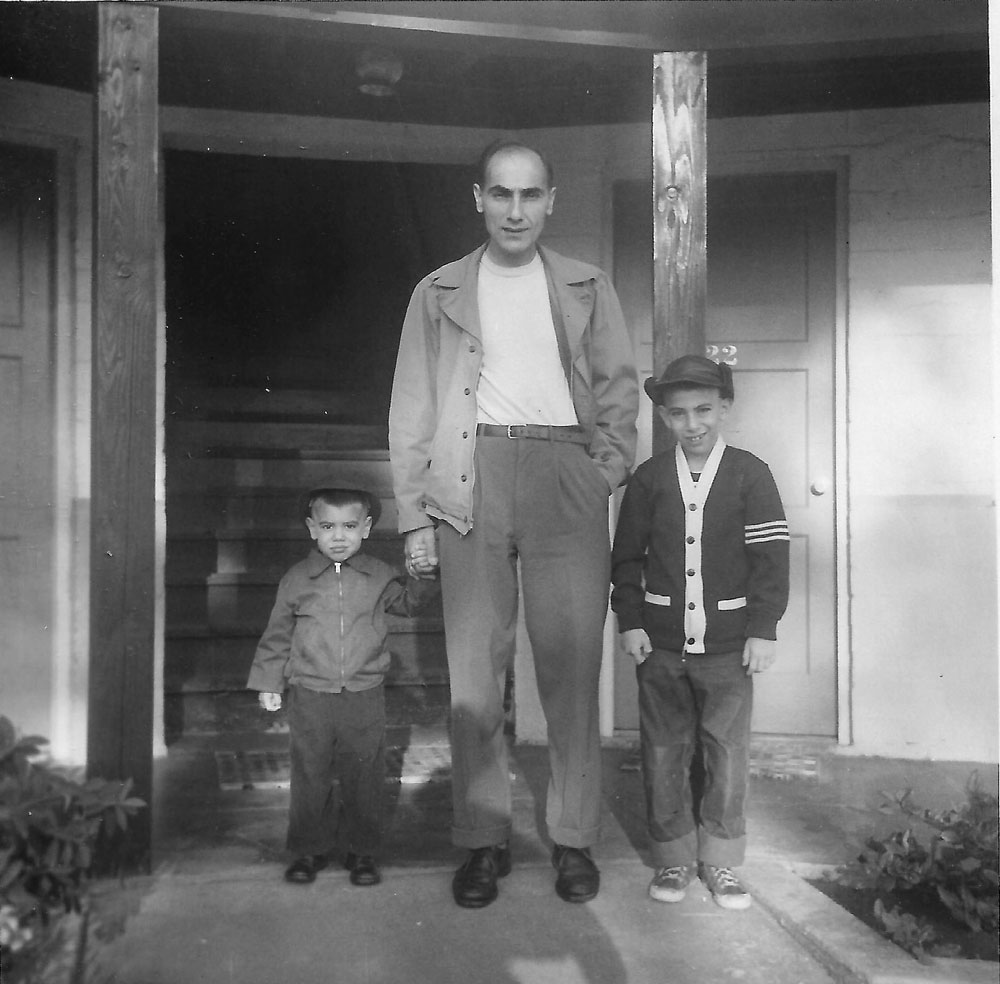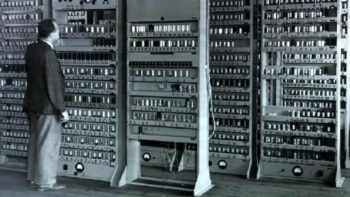Create to Destroy! with Larry Livermore
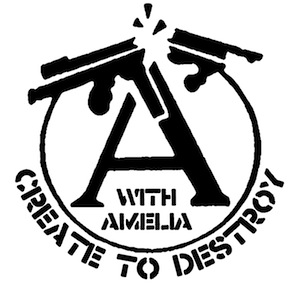
I met Larry Livermore through Mike Berdan in Brooklyn right before I moved to the MRR HQ to be the distribution coordinator. It was one of those, “Oh, you have to meet Larry”-type meetings. He had some funny stories about what it was like living in the old MRR HQ with Tim Yo and was definitely a wealth of history for early Bay Area punk. Whatever your opinion of Larry is, from Lookout Records to his involvement with MRR and Punk Planet magazines, few of us can touch the volume that he has contributed to punk over the years. And after 30-plus years, he’s still at it. Here’s Larry Livermore…
Would you consider yourself infamous?
Is that better or worse than being famous? I don’t even know anymore. I think it depends on who you ask.

What were you doing before punk? I want to see those hippie pictures…
Well, I was always involved in some subculture or another. First I was a greaser and a teenage hooligan, and then, after narrowly escaping prison a couple of times, decided to become a peace-and-love hippie and take a lot of drugs, and then later a glam rocker. But at least in the early days of hippie, before the hairdos and the beards and the self-absorbed delusions got out of hand, there wasn’t as much difference as you’d think between us and the punks of a couple generations later. We were scruffy squatters getting by any way we could and trying to destroy society. Sound familiar?
Where’d the name Livermore come from?
From a mediocre — okay, bad — pulp novel I wrote in 1979 about a nuclear accident at the Lawrence Livermore Laboratory. People who’d read the manuscript (it was never published, so don’t bother looking) started calling me Lawrence de Livermore (my birth name is Lawrence) to make fun of me, and later, when I needed a pseudonym because so many people were mad at me about Lookout magazine, I turned it into Lawrence D. Livermore. Dropped the D after a while, and then at Gilman, Jesse Michaels and some of the other smart alecs started calling me Larry instead of Lawrence, thinking it would wind me up. Well, the joke was on them, because I’ve been Larry Livermore ever since.
You’ve done a lot in punk — why do you think you have accomplished so much and still continue to do so? Is it a DIY attitude? Perseverance? How have you stayed active for so long?
Done a lot? Maybe. Accomplished a lot? It’s probably too soon to tell. DIY? Well, it was never a religion or an ideology with me, just the way it was. My friends and I were weird enough that no one was going to do stuff for us, so basically if we didn’t do it ourselves it didn’t get done. And how have I stayed active? What else am I gonna do? There’s never anything good on TV.
Tell us about Lookout magazine.
Lookout magazine started as sort of a community newsletter when I lived in the mountains of Northern California. But it turned out that the community didn’t appreciate having a newsletter, especially since I wrote pretty openly about the marijuana cultivation that was at the heart of the local culture and economy. So after a group of angry hippies threatened to burn my house down if I didn’t stop writing about stuff like that, I switched my focus more to music and punk rock, which resulted in my finding a whole new audience in the Bay Area and other urban centers, especially among MRR readers. Learning how to make and distribute a xeroxed zine (I later switched into a newsprint format, thanks to some help and advice from Tim Yohannan) helped me learn the skills I would need when Lookout evolved into a record label.
What was zine culture like back then and print media? How was it used in punk?
As you can probably imagine, it was much, much bigger in those pre-internet days. It was the main way word got out about bands and records and shows and venues. Because of that, there was a huge variety of zines. Some, like MRR and Flipside, tried to cover the whole spectrum of punk-related activities, while others specialized in certain aspects of punk culture, and still others were strictly personal, focusing on the individual writer or writers’ experiences, feelings, and ideas. It was a rich and creative time for that sort of publishing, because for a brief time we had the advantages of new technology like cheap xeroxing and photo reproduction without the competition that would come a few years later from the internet.
What do you think of the shift from print media to internet culture?
I often joke about the MRR letters column being the internet message board of the ’80s and early ’90s because of all the arguments that would rage back and forth there. Lookout magazine’s letters column was much the same way. The difference was that while now you can post a snappy comeback in a matter of seconds, back then it would be a month or two between replies. That gave people more time to think about what they were saying, and also made it less likely that the argument would descend into the mindless hate-spewing that characterizes so many internet disputes.
That being said, I’m not at all anti-internet, even though it can be a bit mind-boggling how rapidly everything has changed since the mid-’90s. I think it must be a little bit like the transformation that happened 500 years earlier, when the printing press came into widespread use and made reading and publishing accessible to the masses instead of being confined to the elite. Then, just as now, people were soon complaining that printing lacked the soul and substance of hand-lettered books, and how it was now possible for any old schmuck to publish any old garbage. But on balance, I think most people would agree that printing turned out to be a good thing for people and civilization, and I believe history will render a similar verdict on the internet. As a person of a certain age, of course, I’ll always be a bit nostalgic about the era of the printed book and zine. But time moves on, and we have to, too, unless we want to get run over by it.

Tell us about Lookout Records. Why start a label?
My typical answer is that everything on the radio and on the commercial music scene was so awful that I realized if I ever wanted to have any decent records, I’d have to make them myself. That’s still basically true, but probably at least as important was the sense that something amazing was happening in the East Bay and at Gilman Street and that someone needed to document it. Having learned through Lookout magazine that it was possible for even a doofus like myself, using easily available and affordable technology, to reach thousands of people all over the country and the planet, it seemed like a logical next step to move from print into music.
What was it like getting sleeves made and pressing records back then in the Bay? Were you able to keep it local?
We had to get our records pressed at an outfit called Alberti, in Southern California. It was an independent, family-run company that the majority of the West Coast punks used in those days. The people who ran it were into the art and science of making quality vinyl; they weren’t just commercial hacks. Sadly, they’re no longer around. Our LP jackets — also following the lead of other local punk labels like Mordam and Alternative Tentacles — were printed by a company called Ross-Ellis, in Canada, who I believe are still in business today. When it came to 7″ sleeves, those were mostly done at my favorite 24-hour copy shop just off Telegraph Avenue in Berkeley, where I had a hook-up with the manager, and where I also ran off thousands of copies of Lookout magazine before it went newsprint. Most of our other printing — things like catalogs and LP inserts, lyric sheets, stuff like that, was done locally.
How do you think you contributed to that specific scene in the Bay? It’s pretty crazy that so many of those bands went on to become as big as they did.
That’s kind of a chicken-or-egg question. There’s no way Lookout would have become so successful without the incredibly vibrant and thriving culture that sprung up around Gilman, but I think it’s safe to say that we also, whether for better or worse, helped bring Gilman and the bands that came out of there, to the attention of a much wider audience.
There’s a book called Free Spaces: The Sources of Democratic Change in America, by Sara Evans and Harry Boyte, which I’ve often cited as a partial explanation for what happened at Gilman. The book theorizes that for marginalized cultures to thrive and develop, people need a place where they can gather and work undisturbed and unobserved by the prying eyes and manipulating fingers of the dominant culture.
Gilman was just such a place: pretty much anyone could come there, start a band or an art project of some sort, and find, if not a receptive, at least a supportive audience. But for at least the first couple years, almost no one knew about it except for other punks, artists, and weirdos. Because we had that little mini-world to operate in, we could develop our own ideas and expression without giving much thought to what the outside world might think or not think about us.
You were involved with the early days of 924 Gilman?
Yes, pretty much from the start, though I’d have to point out that we never called it “924 Gilman.” It was the Gilman Street Project at first (I still have the original t-shirt), then “Gilman Street,” then ultimately just plain “Gilman.” The “924 Gilman” name came into use after Tim ended Maximum Rocknroll’s involvement with the club and a new group of people took it over.
How’d you get involved with MRR?
I’d been listening to MRR Radio since the late ’70s, and reading the magazine since it started publishing in 1982, and I’d submitted a couple things about my band and my zine. But I didn’t meet Tim until January of 1986, when Aaron Cometbus introduced me to him at a show at New Method in Emeryville (YOUTH OF TODAY and VIOLENT COERCION, in case you’re wondering). Tim and I hit it off pretty well, both of us being veterans of the 60s scene, and I did a couple more articles and interviews for the magazine (one memorable one with ISOCRACY, for example) before Tim asked me to do a regular column starting in the spring of 1987. The following year I moved into the MRR house on Clipper Street, but that only lasted a few months.
What did you cover in your column?
My MRR column was like a miniature version of Lookout magazine, which meant that I wrote about anything and everything. I was pretty big (and still am) on environmental causes, which Tim was not so keen on (“It’s just a bunch of yuppies who don’t want their views spoiled,” he once said), but I also wrote about mainstream and punk politics, gender and sexuality issues, the never-ending debate about what was or wasn’t “punk,” DIY vs. commercial ethics, violence at punk shows, basically whatever came to mind at any given moment.
Any notable controversy in your punk dealings in the Bay?
Yes, lots. For one thing, I’ve got a big mouth, and especially back then, was in the habit of opening it without giving enough thought to what was coming out. Sometimes I said stuff that was just plain dumb, other times I said stuff that might have been basically correct, but said it in a way that needlessly upset and inflamed people, and still other times I said things that were correct and very much needed to be said, but that quite a few people weren’t ready to hear just yet.
Also, the rapid changes that came about because of Lookout’s success didn’t sit well with a lot of the punks, who no matter how much they like to identify themselves as “radical” and “progressive,” can be astoundingly conservative when it comes to doing anything differently from “the way we’ve always done it” (witness, for example, the stubborn resistance to CDs back then, or to mp3s in more recent times). There’s a significant sector of the punk community that believes as soon as anyone outside of their immediate scene finds out about or likes one of “our” bands, then that band has effectively “sold out” and is no longer punk. That goes double or triple or quadruple for the label that helps a band get known beyond the scene. So while initially almost everybody was very supportive of Lookout Records, as soon as we started becoming known much beyond the Bay Area, there were people accusing us of ruining everything.
To be fair, they weren’t completely wrong. There’s an old Chinese proverb that goes, “As soon as you give a name to something, it begins to die,” and the punk corollary might well be, “As soon as you identify a scene, you’ve planted the seeds of its destruction.”
Any controversy at MRR?
Yes, very much so. The thing was, Tim and I got along quite well until I moved into the MRR house. I mean we’d always had our debates and arguments, but they turned more heated and even sometimes a little bitter once we were constantly around each other. I think it was a case of one too many roosters in the barnyard. It wasn’t that I ever tried to boss Tim around — only an idiot would try to do that — but probably because I was Tim’s own age, I was less easily bossed than other, mostly younger, MRR staffers. Tim was a near-legendary character, but one of the reasons he was able to accomplish so much was that he seldom if ever doubted his own judgment. The problem was that I was a little like that myself, so when the two of us butted heads, there was some serious butting going on. A lot of loud arguments, mostly good-natured, but not always, went on in the MRR office and living quarters. Tim and I got along a lot better after I moved out.

Why did you leave MRR?
Unfortunately, Tim and I didn’t continue getting along indefinitely. For the most part, I had complete freedom to write whatever I wanted in my column, but there were certain subjects and people — not many, but a few — that we just plain weren’t supposed to talk about, whether favorably or unfavorably. Occasionally, Tim would even go into my column after I’d submitted it for publication and change a few words to make it read the way he thought it should. I accepted that, even though it made me feel a bit queasy, because I had a lot of respect for the guy.
But things really went off the rails when Tim unilaterally fired Jeff Bale, who’d been one of MRR’s co-founders, because he thought Jeff’s columns were moving too far to the right politically. I’d known Jeff for many years, long before I came to MRR, and liked him as a person, but ironically, I tended to agree politically much more with Tim than I did with Jeff.
However, I felt that as a matter of principle, MRR should have room for a variety of viewpoints (as long, of course, as they weren’t intrinsically racist or sexist or fascist, which Jeff’s definitely weren’t). We had a dramatic meeting where all the MRR volunteers got together to debate this and vote on whether Tim should have the power to control the magazine’s content, or if it should be left up to the larger community. The vote went pretty strongly in Tim’s favor. This was at the same time that Tim had announced restrictions on what kind of music MRR would cover, on the grounds that too much stuff that he didn’t consider authentically “punk” was finding its way into the magazine.
I too felt strongly that MRR should remain committed to being a punk zine, but thought Tim’s definition of the genre was far too narrow (he was getting very much into garage music at that time, something I thought was more of a retro thing for aging punks to listen to in bars when they were too old for the pit at Gilman), while turning his nose up at much of the poppier punk as well as the sort of hardcore that was being championed by Ebullition and, soon afterward HeartattaCk zine. At that point, I decided I didn’t really belong at MRR anymore, and regretfully submitted my resignation.
What did you do for Punk Planet?
The main thing was writing a column, which I did for every issue from 1994 until they ceased publishing in 2007. But I also had a small hand in helping start the zine, mostly in an advisory role. I’m not sure how widely this is known, but those of a certain age will recall that on AOL, during the early days of the internet, there used to be punk chat rooms, and Punk Planet came to life as a result of conversations between kids in different parts of the country in one of those rooms. They were complaining about the changes happening at MRR, and I said, “Why don’t you just start your own zine?”
They were like, “You can do that? Isn’t it hard?” Bear in mind that most of them, including Dan Sinker, the eventual editor and publisher, were still teenagers at the time. So basically I just told them how I’d gotten into the publishing game, and gave them a few basic pointers. More than anything else, though, I just encouraged them to believe in themselves and their own abilities, and they made a pretty good go of it for quite a while.
Why do you think all the other publications, like Punk Planet, went under but MRR survived?
Max Weber, the German sociologist, had a theory that I think goes a long way toward explaining this. Weber believed that every great social, religious, or political movement begins with a charismatic leader — think Mao, Lenin, Jesus, Mohammed, etc. — but those that survive are the ones that establish a bureaucratic structure that enables the movement to become an institution that carries on after the original leader is gone. By “bureaucratic,” he didn’t mean the usual way the word is used today, i.e., government red tape, pointless busybodiness, that sort of thing, but rather a system where the work and duties of carrying on the movement are defined in a way that new people can easily step into and fill any given position. For instance, as applied to MRR, there’s a system for doing zine and record reviews that’s been in place for over 30 years now. Every zine and record reviewer could disappear today and tomorrow you could bring in some new ones who’d take up where the vanished ones left off.
Most zines or labels or social movements tend not to outlive their founders, but if I know Tim at all, he was already planning ways of ensuring MRR would carry on after him long before he knew he was ill or would die prematurely. Although he established himself as the first among equals, he was always a true communist (with a small “c”) in the sense that he considered the cause and the movement more important than any one individual, including himself. That’s my theory, anyway.
You’ve been involved in a lot of punk media outlets, including film — can you tell us a bit about projects like Pansy Division?
I’m not sure if you’re referring to the band PANSY DIVISION, or the film about them. Assuming it’s the latter, yes, I’ve developed quite an afterlife as a talking head in many documentaries about various bands and the scene in general, and there are a few more still in the works at present (there’s one about the history of the East Bay where I was interviewed for a staggering seven hours, and this for a film that has hundreds of other interviews and is only supposed to be about two hours long in total).
With the PANSY DIVISION project, it was simply a matter of someone from the band asking me to be in it, and me going over to Luis’s warehouse and answering some questions on camera. I’ve heard it was quite a good documentary, but I don’t know what exactly I said or how much or me is in the finished product, because I’ve never actually seen it. I don’t especially enjoy watching myself on film.
How long did it take you to write your book and how did Don Giovanni Records get involved?
You’re talking about Spy Rock Memories, which took an embarrassingly long three or four years to write, partly because I’m slow, but also because it started out as a series of blog posts which were simultaneously being published in the Anderson Valley Advertiser, a small local (and very radical) newspaper that serves the Northern California area where Spy Rock Memories takes place. Joe Steinhardt, from Don Giovanni Records, had been reading the excerpts online, and began suggesting to me that we turn it into a book, which, after a year or so of prompting on his part, I agreed to do. Then another year or two of editing, rewriting, and polishing ensued, and simple as that, a book!
I’m just about finished with my second book, about the Lookout era, which Don Giovanni is also publishing, and should be out soon. This one only took a year and a half, so I’d say that represents progress!
How can we best stay up to date on what you’re doing and get in touch?
larrylivermore.com, @LarryLivermore on Twitter, Larry Livermore on Facebook. There’s more, but that seems like a good enough start.

